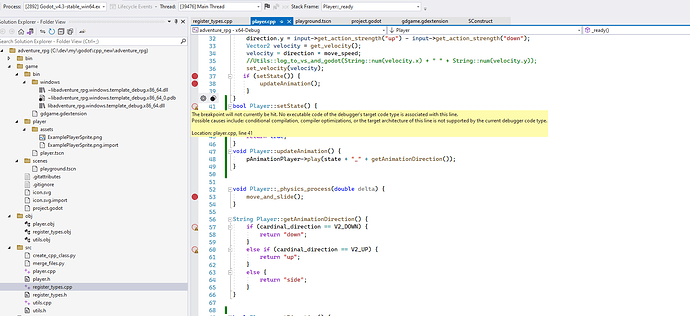Godot Version
4.3 windows
Question
Hello everyone,
UPDATE: testing it in some other project looks like i can’t put any custom method in the process method . whats going on here ?
I’m facing a strange issue while compiling a GDExtension in debug mode using Visual Studio C++. Some breakpoints work as expected, while others don’t.
I’ve tried recompiling multiple times and verified that the output is in debug mode, but no matter what I do, only some breakpoints are hit while others are not.
this is what the non working breakpoint massage say
it is compiled many time , can’t be the code is not updated to the output dll
this is the scons im using to compile:
#!/usr/bin/env python
import os
import sys
# Extract the required values
my_project_name = "adventure_rpg"
my_project_dir_name = "game" # 'game' replaces the old 'demo'
my_godot_cpp_name = r"C:\dev\my\godot\cpp_new\godot-cpp\godot-cpp\SConstruct"
my_project_src_dir = r"C:\dev\my\godot\cpp_new\adventure_rpg\src"
def normalize_path(val, env):
return val if os.path.isabs(val) else os.path.join(env.Dir("#").abspath, val)
def validate_parent_dir(key, val, env):
if not os.path.isdir(normalize_path(os.path.dirname(val), env)):
raise UserError("'%s' is not a directory: %s" % (key, os.path.dirname(val)))
libname = my_project_name
projectdir = my_project_dir_name
godot_cpp_path_SConstruct = my_godot_cpp_name
this_project_src = my_project_src_dir
print(this_project_src)
localEnv = Environment(tools=["default"], PLATFORM="")
# Explicitly set the PLATFORM variable based on the running OS.
if sys.platform.startswith("win"):
localEnv["PLATFORM"] = "win32"
else:
localEnv["PLATFORM"] = sys.platform
if 'MSVC' in localEnv['TOOLS']:
localEnv.Append(CCFLAGS=['/std:c++17'])
# Custom messages for MSVC compile and link commands.
localEnv['CCCOMSTR'] = 'Compiling (MSVC): $SOURCE'
localEnv['SHLINKCOMSTR'] = 'Linking (MSVC): $TARGET'
else:
localEnv.Append(CCFLAGS=['-std=c++17'])
localEnv["compiledb"] = False
customs = ["custom.py"]
customs = [os.path.abspath(path) for path in customs]
opts = Variables(customs, ARGUMENTS)
opts.Add(
BoolVariable(
key="compiledb",
help="Generate compilation DB (`compile_commands.json`) for external tools",
default=localEnv.get("compiledb", False),
)
)
opts.Add(
PathVariable(
key="compiledb_file",
help="Path to a custom `compile_commands.json` file",
default=localEnv.get("compiledb_file", "compile_commands.json"),
validator=validate_parent_dir,
)
)
opts.Update(localEnv)
Help(opts.GenerateHelpText(localEnv))
env = localEnv.Clone()
# Force SCons to print the full command line for every compile/link action.
env["PRINT_CMD_LINE_FUNC"] = lambda cmd, target, source, env: print(" ".join(cmd))
env.Tool("compilation_db")
compilation_db = env.CompilationDatabase(
normalize_path(localEnv["compiledb_file"], localEnv)
)
env.Alias("compiledb", compilation_db)
env = SConscript(godot_cpp_path_SConstruct, {"env": env, "customs": customs})
def find_directories(directory):
directories = ["src/"]
for root, dirs, files in os.walk(directory):
directories.extend(["src/" + os.path.relpath(os.path.join(root, d), directory).replace("\\", "/") + "/" for d in dirs])
return directories
source_dirs = find_directories(this_project_src)
env.Append(CPPPATH=source_dirs)
print("Source directories detected:", source_dirs)
# Define object directory
obj_dir = "obj/"
if not os.path.exists(obj_dir):
os.makedirs(obj_dir)
print("Source directories detected:", source_dirs) # Debug detected directories
sources = []
for d in source_dirs:
cpp_files = Glob(d + "*.cpp")
print(f"Found {len(cpp_files)} files in {d}: {[str(f) for f in cpp_files]}")
sources.extend(cpp_files)
print("Final list of source files:", [str(f) for f in sources])
# (Optional) Collect all source files again if required by the build process.
sources = []
for d in source_dirs:
sources.extend(Glob(d + "*.cpp"))
# Create object files in obj_dir
objects = []
for source in sources:
obj_file = os.path.join(obj_dir, os.path.splitext(os.path.basename(str(source)))[0] + ".obj")
objects.append(env.Object(target=obj_file, source=source))
# Define the output library file exactly as in your original configuration.
file = "{}{}{}".format(libname, env["suffix"], env["SHLIBSUFFIX"])
libraryfile = "bin/{}/{}".format(env["platform"], file)
# Link objects into a shared library.
library = env.SharedLibrary(
target=libraryfile,
source=objects
)
copy = env.InstallAs("{}/bin/{}/lib{}".format(projectdir, env["platform"], file), library)
default_args = [library, copy]
if localEnv.get("compiledb", False):
default_args += [compilation_db]
Default(*default_args)
Has anyone encountered this issue before? Any suggestions on how to fix it?
Thanks in advance!
